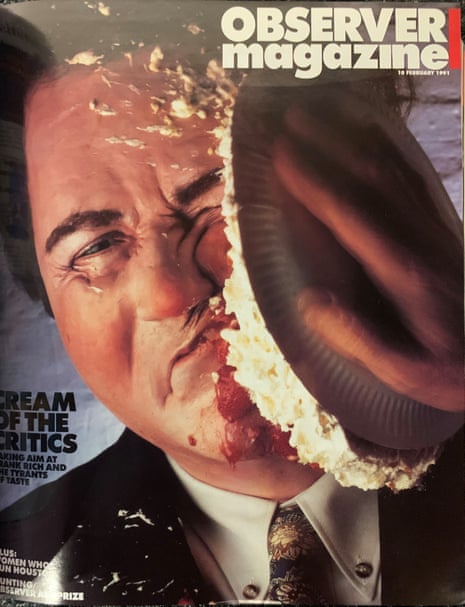The custard pie is the traditional slapstick method of pricking the pomposity of the powerful, and for the cover of the Observer Magazine of 10 February 1991, it was thrown at Frank Rich, the theatre critic of the New York Times (‘Tyrants of taste’). But was he really that influential?
‘The eyes of critics,’ sneered Walter Savage Landor, ‘are both on one side, like those of a turbot.’ Washington Irving said: ‘Critics are like deer, goats and diverse other graminivorous animals, who gain substance by gorging upon buds and leaves of the young shrubs of the forest, thereby robbing them of their verdure and retarding their progress to maturity.’
‘In a dangerous city,’ wrote Andrew Stephen in a profile of Rich, ‘there can be few people who turn a corner with more care.’ Rich was one of the most feared critics in the world, able to make or break shows – the ‘Butcher of Broadway’ is how one magazine described him. ‘A producer dying of Aids is rumoured to have volunteered to kill him on behalf of other enraged victims.’ But Stephen argued Rich was doing his job by ‘ruthlessly dissecting mediocrity’, including Andrew Lloyd Webber’s latest, Aspects of Love, which Rich said ‘generated about as much heated passion as a visit to the bank’. Actors in particular seemed to be hurt by unfavourable reviews. When Diana Rigg wrote a 300-page anthology of nasty notices, No Turn Unstoned, it was acclaimed by a profession getting a lot off its collective chest.
John Fairchild’s Women’s Wear Daily was ‘delivered off the press like the tablets from Mount Sinai’. But Robert Parker, author of the Wine Advocate, acknowledged that power and refused vineyard hospitality, to keep his judgment pure. His system of marking wines out of 100 was the ‘gimmick that has attracted the world’s attention’, though he gives every wine he examines 50 points just for being wine. Even Blue Nun.
